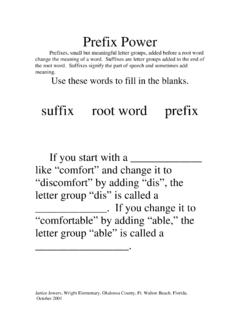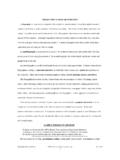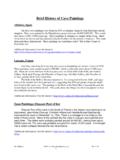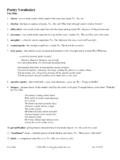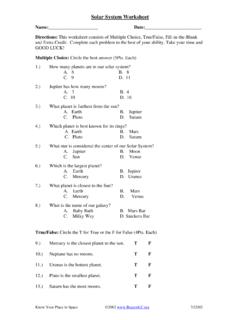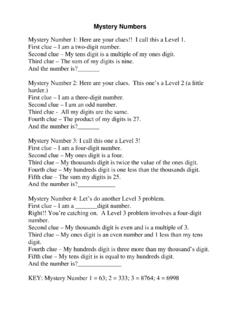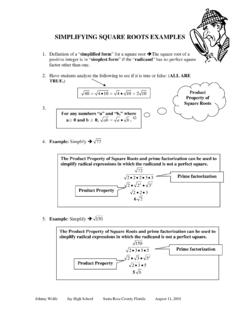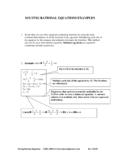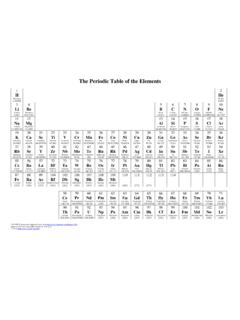Transcription of Pre and Post Tests MULTIPLE CHOICE 1. - Beacon …
1 Pre and post Tests Use the periodic table to answer these questions. MULTIPLE CHOICE 1. Neon is an example of a(n): A. Alkali Metal B. Noble Gas C. Halogen D. Rare Earth Metal 2. An element that has two valence or outer level electrons would be considered a(n): A. Nonmetal B. Noble Gas C. Halogen D. Metal 3. Sodium is in the same group or family as: A. Lithium B. Helium C. Calcium D. Thorium 4. Iodine is an example of a(n): A. Noble Gas B. Halogen C. Alkali Metal D. Rare Earth Metal 5. If an element is a gas at room temperature, then it must be a(n): A. Alkali Metal B. Nonmetal C. Halogen D. Alkaline Earth Metal 6. If an element has one to three valence or outer level electrons, then it is a(n): A.
2 Nonmetal B. Halogen C. Noble Gas D. Metal 7. Which of the following elements belongs to the group that includes the most active metals? A. Aluminum B. Sodium C. Iron D. Mercury GRIDDED RESPONSE 8. How many valence or outer level electrons does an atom of the element argon have? _____ SHORT RESPONSE 9. Barium and magnesium are both found in the same group in the periodic table . Name two properties that they would be expected to share.
3 EXTENDED RESPONSE 10. Chlorine and bromine are both found in the same group in the periodic table . Name this group. Are these elements metals or nonmetals? How many valence electrons do they have? Name a property that these two elements would be expected to share. TEACHER ANSWER SHEET MULTIPLE CHOICE 1. B 2. D 3. A 4. B 5. B 6. D 7. B GRIDDED RESPONSE 8. 8 valence electrons SHORT RESPONSE 9.
4 Any two of the following would be an acceptable response: Chemically active Dense Lustrous Good conductor Solid at room temperature Silvery gray color EXTENDED RESPONSE 9. Question 1 - Halogen Question 2 - Nonmetal Question 3 - Seven Question 4 Any of the following responses would be acceptable: Chemically active Low density Poor conductor Translucent Gas or
5 Liquid at room temp. Scoring Rubric for Short Response Question: 0 points No correct answer given 1 point One correct answer given 2 points Two correct answers given Scoring rubric for Extended Response Question: 0 points No correct answer given 1 point One correct answer given 2 points Two correct answers given 3 points Three correct answers given 4 points Four correct answers given Name _____ Class _____ Student periodic table Worksheet 1.
6 For each of the following elements, give the following information: Symbol Atomic number Atomic mass Group or family Number of valence electrons Metal or nonmetal A. Barium B. Xenon C. Fluorine D. Rubidium E. Calcium F. Krypton G. Iodine H. Radium I. Strontium J. Potassium 2. List four properties of metals and four properties of nonmetals. Answer Key to Student periodic table Worksheet 1. A. Ba, 56, , 2, 2, Metal B. Xe, 54, , 18, 8, Nonmetal C.
7 F, 9, 17, 7, Nonmetal D. Rb, 37, , 1, 1, Metal E. Ca, 20, , 2, 2, Metal F. Kr, 36, , 18, 8, Nonmetal G. I, 53, , 17, 7, Nonmetal H. Ra, 88, , 2, 2, Metal I. Sr, 38, , 2, 2, Metal J. K, 19, , 1, 1, Metal 2. METALS Solids (except mercury) Good conductor (of heat and electricity) Lustrous Malleable Ductile High density Tend to lose electrons in chemical reactions Compounds tend to be basic NONMETALS Solid, liquid, or gas Poor conductor Dull surface, transparent, or translucent Brittle (if solid)
8 Low density Tend to lose electrons in chemical reactions Compounds tend to be acidic Student Group Evaluation Checklist 1. Element name 2. Atomic number 3. Atomic mass 4. Number of valence electrons 5. Metal or nonmetal 6. Physical properties 7. Chemical properties 8. Effective delivery and acceptable degree of clarity of presentation 9. BONUS POINT: Awarded for effective use of visual aids Group presentations will be graded on a scale of one to eight based on number of items indicated as satisfactory on the checklist. One bonus point will be awarded for effective use of student-prepared visual aids.
